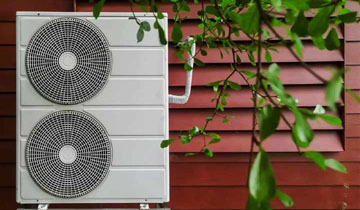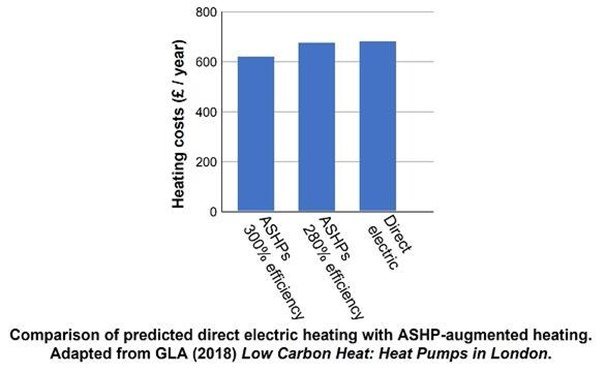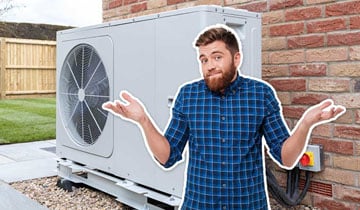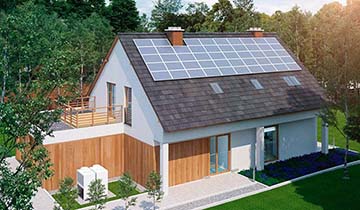9 min read
Is a heat pump worth considering for my project? - A beginner’s guide
There has been and continues to be a lot of talk around heat pumps being the go-to low-carbon alternative for heating our homes and, to be fair,...
4 min read
 Chris Hedges
:
Apr 26, 2022
Chris Hedges
:
Apr 26, 2022

If you search for information on heat pumps via Google or any other search engine, you will see a mass of opinion. Some articles claim heat pumps to be the only heat source solution for helping to reach net zero whilst others take a more conservative approach. So, for the ‘neutral’, trying to get any sense of clarity on what is best for heating our homes in the future is a bit of a minefield.
As a manufacturer of electric heating, we wanted to unravel some of the opinions to answer the question; will heat pumps replace direct electric heating?
What we discovered, in short, is that the answer is ‘no’. But we wanted to explore this further.
What are heat pumps and how do they work?
Heat pumps are one of the most efficient systems to use for heating and cooling. They move heat by using a compressor to circulate either a gas or liquid refrigerant. For example, an air source heat pump absorbs heat from the air outside into the refrigerant. The refrigerant gets compressed by the pump to increase its temperature and then it is condensed to release the stored heat into your home.
Ground source heat pumps work slightly differently. Instead of absorbing heat from the air (yes, you guessed it), they absorb heat from the ground via a mixture of water and antifreeze which is pumped around a network of pipes buried underground.
Heat pumps and the journey to net zero
Heat pumps are being heavily back by government yet comparative studies between heat pumps and direct electric heating have not been carried out in real world situations.
In addition, a recent article published by the Express suggested that for many homeowners, ripping out gas boilers and replacing them with heat pumps could cost in excess of £20,000. This is because installing a heat pump is only part of it. Many millions of poorly insulated homes will need money spent on significantly improving the insulation of their home to make the heating system energy efficient. A project like this can cost around £10,000 on its own.
Dr Matthew Aylott – Senior Policy Adviser, Department of Business, Energy and Industrial Strategy (BEIS) suggests that “Government is only recommending the installation of heat pumps in ‘fit-for-purpose’ houses.” These would be predominantly well insulated new build homes.
There’s no disputing it, heat pumps will play a large role in meeting net zero but some of the hidden challenges around them seem to not be addressed. However, the addition of direct electric heating will enable even greater efficiencies both directly and through hybrid heat pump installations.
There is certainly a future in heat pumps but that future is in buildings that have the ‘ideal circumstances’ in place. Ideal conditions include:
For a significant number of buildings, heat pumps could be viewed as just a medium-term recommendation by the government while more thorough field tests are being completed on other, more effective heating systems.
In short, heat pumps will have their place, but they aren’t necessarily the one size fits all approach to efficient low-carbon heating. They are more suited to new-build projects, and not so well suited to retrofit. With over 26 million homes needing to be upgraded, it is questionable if heat pumps have the answer.
With this in mind, there are other ways of heating which fill the gap that heat pumps leave. This includes renovations, smaller houses, flats and generally buildings where wasted space is an issue.
Options for low-carbon direct heating:
These options fit nicely with the rental housing market in particular. For heating in a rental property, the ideal situation is:
Direct electric heating fits into all of these categories and can be installed in to any property (often coming out with better efficiency ratings) even where space is at a premium.
Atamate, a smart building software company in Oxford, wrote a brilliant piece on air source heat pumps and direct electric heating in a typical setting in London. The results research shows the air source heat pumps compare unfavourably to direct electric heating derived from main electricity when using real world data.

Read ‘Heat pumps take on direct electric heating in London’.
The main place that direct electric heating is going to fit into the market is primarily where space is at a premium. This includes renovations where you can’t change the full heating system to suit a heat pump. In this instance a swap for an electric boiler could be the answer. However, if you are renovating the floors then a low-profile underfloor heating would be ideal.
Direct electric heating is going to fill the gap where heat pumps have a low performance or where they can’t be installed practically. There’s space in the market for both, and in many cases they will work alongside each other but the market can’t do without one or the other.
Together they meet the market needs and that’s where the future lies.
If you have any questions regarding the future of direct electric heating or further information on the electric heating range, please reach out to one of the team on 0800 019 5899 or contact us another way.

9 min read
There has been and continues to be a lot of talk around heat pumps being the go-to low-carbon alternative for heating our homes and, to be fair,...

9 min read
If you’re one of over 2 million homes in the UK not connected to a mains gas supply you know the challenges surrounding heating your home. In this...

4 min read
Launched in the latter part of 2022, the report ‘Working towards Net Zero’ sheds light on the UK construction industry’s attitudes toward direct...